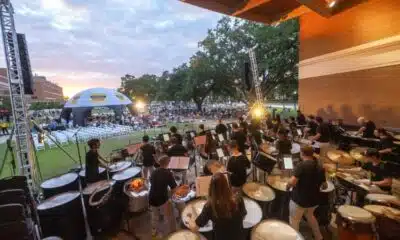Mississippi Today
In the heart of a stretch of southwest Mississippi sits Prospect Hill, a link to the past that stretches across the globe
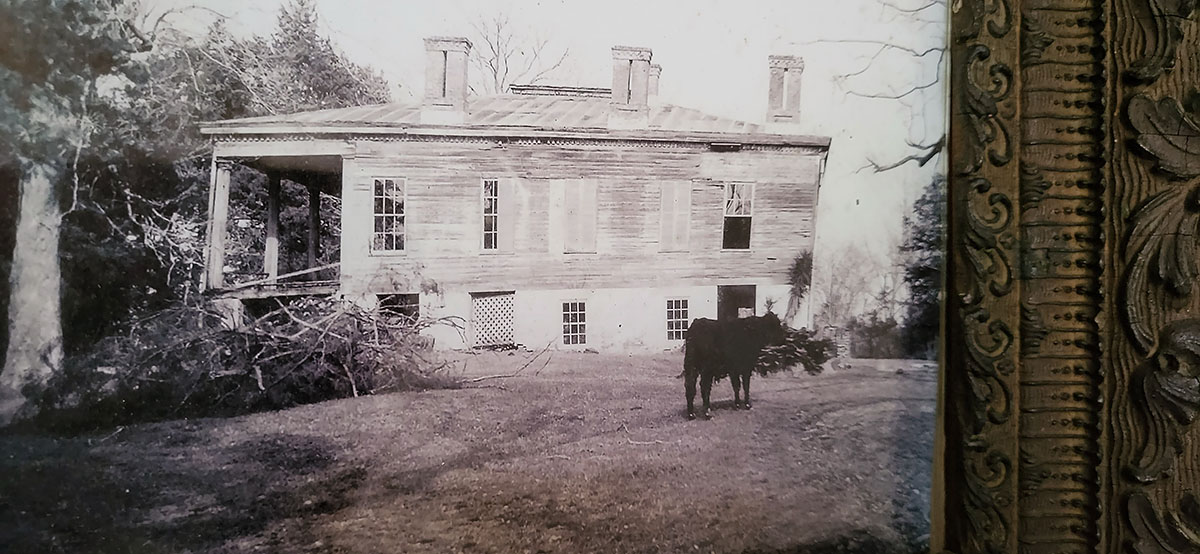
Prospect Hill, a preserved, abandoned building hidden deep in the woods of Jefferson County, Mississippi, is a connection to the history of Liberia in West Africa and to the lives of descendant communities of over 300 enslaved-ancestors from Mississippi.
Former slaves of Capt. Isaac Ross established the Liberian colony known as “Mississippi-in-Africa”, as called for in his will.
Shawn Lambert, assistant professor of anthropology at Mississippi State University, began an excavation of the site June 18, assisted by James Andrew Whitaker, a cultural anthropologist.
A foundation in the ground adjacent to the big house, barely noticeable, is the primary focus during this first broad excavation. Lambert and Whitaker believe many of the enslaved people worked and lived in what could be a dependency, or kitchen house.
With help from participants from the public, they unearthed evidence on the 23.3 acres dating around the early 1800s to late 1800s supporting their hypothesis about the lives and cultural activity: gunflints, chunks of rock used to generate sparks to ignite gunpowder; leadshots, originally used in muskets and early rifles; a 4- to 7-inch knife-blade; dark, rich green fragments possibly from a wine bottle, white pieces from a ceramic plate, and cut (tapered-rectangular) and square (hand-forged) nails.
“These artifacts don’t just provide insight into the daily lives of the people who lived and the tools utilized in their world, but the environment and landscape of how they interacted with each other,” Lambert told Mississippi Today.

Lambert and Whitaker began the archaeological excavation of the Lorman plantation site to understand how aspects of material and social culture from the slaves’ lives in Mississippi were carried through this transAtlantic reverse migration.
As leader of the excavation, Lambert taught the participants archaeological methods and ethical archaeology to have a more “holistic narrative” of what occurred at Prospect Hill.
Nikki Mattson, a Southeast field representative for the Archaeological Conservancy, participated in the dig because she came across the book “Mississippi in Africa” by Alan Huffman around 15 years ago. She said she was at a place and time in her life where she was questioning a lot of the “deep inherent things” she was taught growing up in the Mississippi Delta, and the book was a pivotal moment for her.
After gaining her master’s degree in archaeology, she applied to the conservancy and found that it owned that property. Mattson said she takes any chance to be involved seriously.
“Even though these artifacts might seem kind of insignificant, little things to some people, it’s really huge,” Mattson explained. “It’s all these little pieces of a bigger story, and that’s exciting.”
Finding materials at the site and combining them with historical records to gain a better understanding of the past, while providing a learning experience, Lambert said.
“I think working at this site and working with the descendant communities can have a positive effect on people who come and work. (We can) realize the history and acknowledge the history that has gone on here,” Lambert said.
He said he believes this type of fieldwork can educate people statewide. By looking at the shapes, colors and textures of found artifacts, he can uncover the history of a place and reveal aspects of life that would otherwise be lost.
“I think archaeology is a powerful tool (that allows us) to talk about history and a history that maybe Mississippi doesn’t talk about a lot,” Lambert explained, “our history of enslavement.”
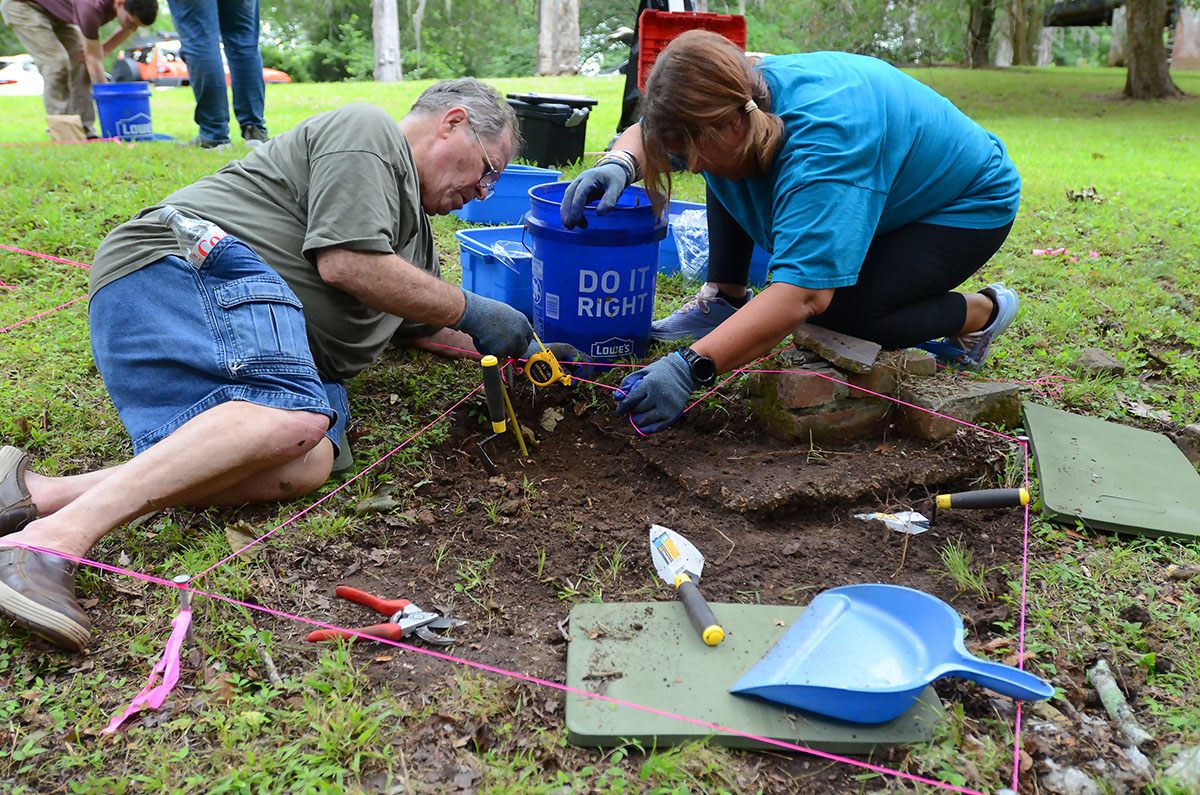
Whitaker, a cultural anthropologist, began his research in West Africa and talked with descendants and some indigenous people not related to the Mississippi settlers.
This summer, he conducted 12 interviews in Liberia, along with 52 last summer in Monrovia and different locations of Sinoe County, Liberia, (the capital of Greenville, Louisiana and Lexington). His research inspired the idea for this excavation.
“This kind of research uncovers aspects about settlement and the history of Liberia as it relates to the United States,” Whitaker continued, “and also as it precedes those interactions with the United States by a long time.”
Whitaker said he and Lambert are attempting to trace this cultural movement, through this collaborative project with the Archaeological Conservancy and the descendant communities of the enslaved ancestors along with grants funded by the Mississippi Humanities Council and Mississippi State University Global Grant.
“We want to understand more about the lives of the people who never went to Liberia and also the ones who later became the first American LIberian settlers.” Whitaker said. “We’re hoping to follow up this excavation with a second one, maybe one or two years from now, to map the material culture in Mississippi to the material culture in Liberia.”
Through this mapping, they aim to uncover aspects of ancestors’ lives in Mississippi that were carried with them and trace the changes in the social lives of those same people.
“I think using the power of archaeology to connect the past with today is powerful,” Lambert said. “This is the beginning of what could be something a lot larger and much more special for research and this community.”
The excavation continues through June 28.
Revolutionary War veteran Capt. Issac Ross founded Prospect Hill in the woods of former Mississippi Territory around 1808.
Traveling from South Carolina to Jefferson County, Mississippi, Ross brought hundreds of slaves and freed Black people he served with in the Revolutionary War.
Soon, his accumulated wealth allowed him access to more acreage and slaves. He allowed his slaves to read and write, illegal at the time in Mississippi. They also learned skills and trades.
When Ross prepared his will in 1834, he stipulated that his plantation should be sold and the proceeds used to pay for his slaves’ passage to the newly established colony of Liberia in western Africa formed by a branch of the American Colonization Society, the Mississippi Colonization Society, of which he was a member.
He didn’t want families separated, and those who remained at the plantation would work for pay and be considered free men. The will stipulated his plans would be set in motion once his daughter, Margaret Allison Reed, passed away. Ross died two years after the will was drawn up, and Reed shortly after in 1838.
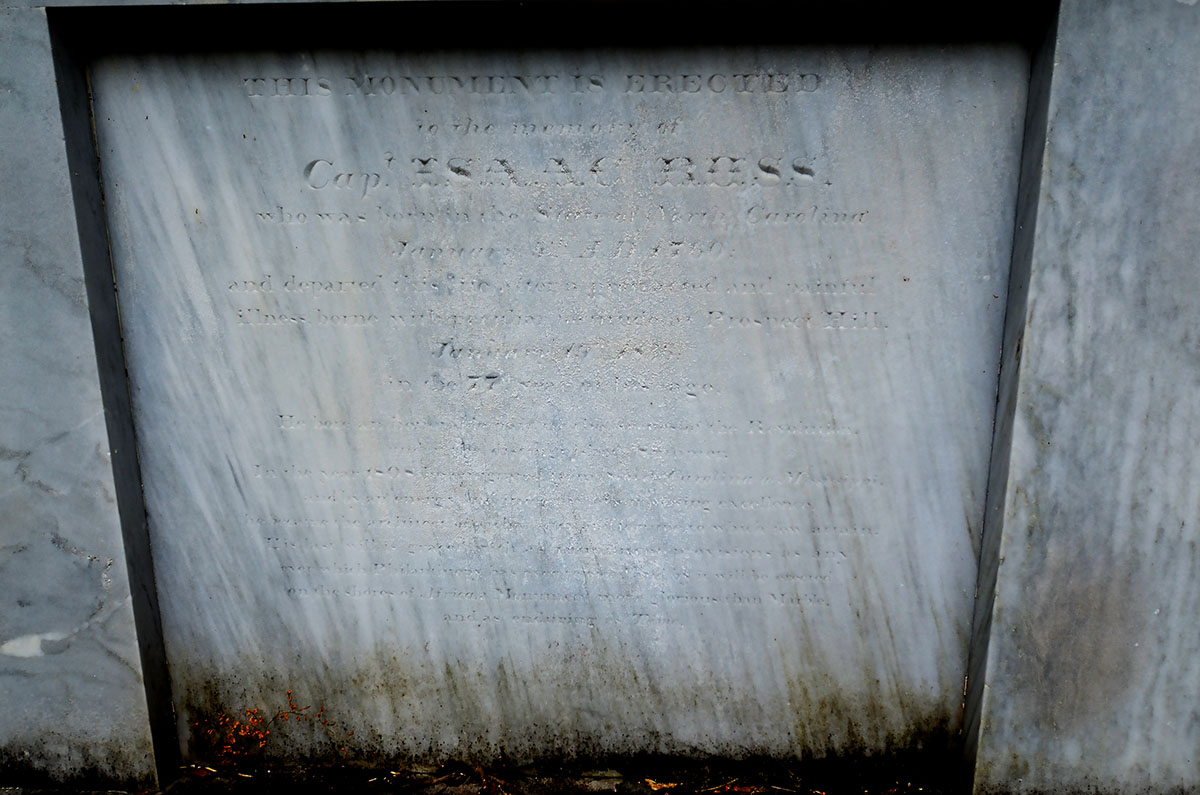
It was left to Isaac Ross Wade, son of Jane Brown Ross (one of Capt. Ross’ three daughters) and the executor of the will, to uphold the will’s provisions. Instead, Wade contested the will’s legitimacy for more than a decade.
He stopped the slaves from gaining their freedom, leading to a revolt. The mansion burned to the ground in April 1846 under alleged suspicious circumstances, taking the life of a 6-year-old girl. Overseers, hearing rumors of the slaves’ plot to kill the family, lynched at least 11 slaves believed to be involved.
A few months later, the Supreme Court ruled in favor of Ross’s will. About 120 of Ross’ 160 slaves left for Africa, while the others remained in Jefferson County as slaves. In total, the coalition society arranged for 300 free ex-slaves to travel to Africa.
The plantation house was finally sold in 1848, but the African colony received none of the proceeds. The house returned to Wade’s possession in 1850, and he built the present-day house there in 1854.
The home survived the Civil War and Wade’s death in 1891. After Wade’s death, his brother Battaille Harrison “BH” Wade retained ownership of the house. From 1956 onward, descendants of those enslaved occupied the house. And in 1968, others occupied the site until it became unlivable through neglect.
It wasn’t until 2011 when the Archaeological Conservancy acquired the property that the preservation of the historical site started.
The existence of this rare Mississippi plantation site spans over two continents and over 200 years, with history embedded in its grounds.
“We know a lot about what went on inside the big house. It’s the other side of the story we want to know (such as) the enslaved people who built it and kept it running and the people who have ties to it,” Jessica Crawford, the Southeast Regional director of the Archaeological Conservancy, told Mississippi Today.
The Archaeological Conservancy primarily works on archaeological evidence buried in the ground. However, Crawford convinced her board of directors to consider Prospect Hill because of the site’s significant history.
As of 2023, Crawford said she is talking to architects to draw a blueprint to preserve the house. She also talked to a private donor who is willing to pay for the proposed plan.
“There’s a lot of work that needs to be done to keep it standing. I don’t know specifically where we will start yet,” Crawford said.
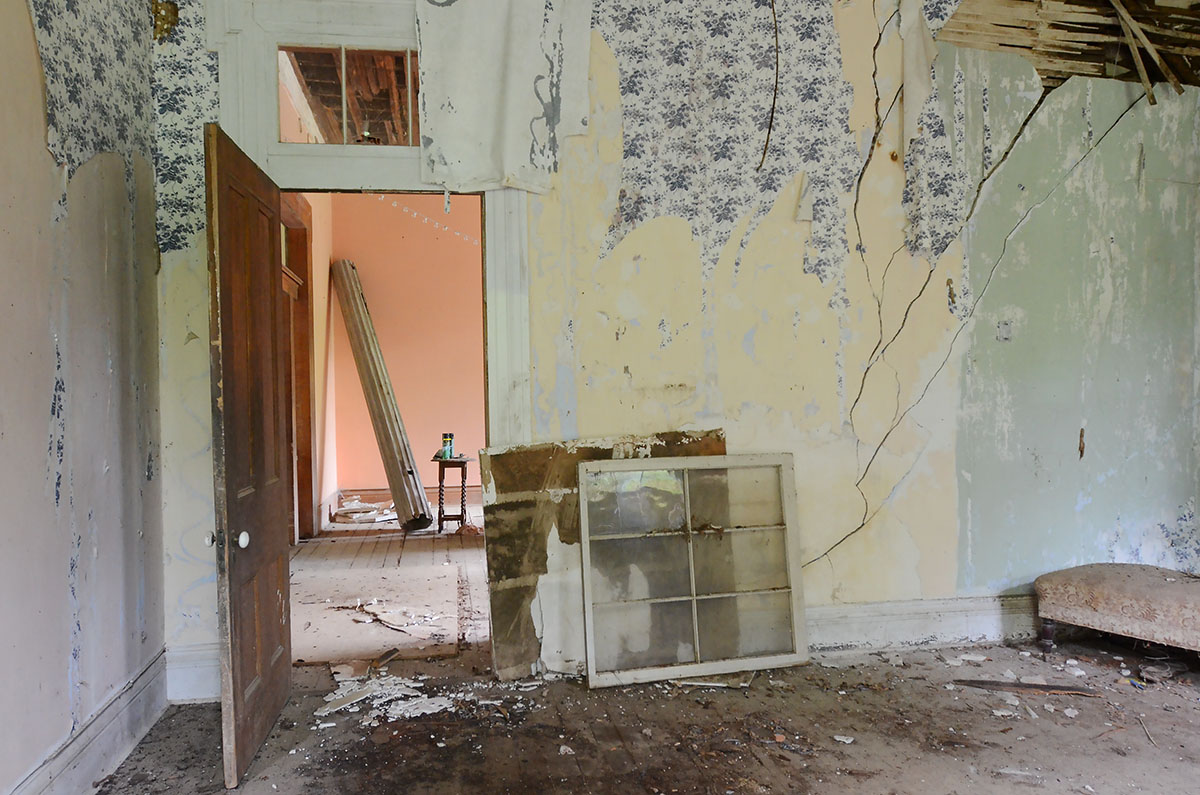
Parts of the house are rotting from previous rains. Plaster on the walls is cracking and falling onto the rotten wooden floor, making it dangerous to walk on. The original porch has not been rebuilt. Termites are eating away at newly constructed wood. In addition, the site lacks water due to lack of community water in the rural area.
“We don’t plan to restore it to some grand plantation house. We want floors so it’s better and safer to walk on,” Crawford explained. “We eventually hope to use it for things like public archaeology events, like this one, and public outreach events like an open house.”
In 2012, one year after the Archaeological Conservancy acquired the site and 3.1 acres, the organization acquired an additional 20 acres. There were many projects to focus on, but replacing the roof was a major concern. The 2017 roof installation was a critical step in preserving the home’s flooring.
“I used to have probably 25 kiddie swimming pools in there catching water every time it rained and that roof absolutely saved it,” Crawford continued. “It’s still dry when it rains, and it wasn’t (dry) for a long time.”
Crawford raised money through donations and grants separate from the organization’s regular funding sources to pay for the new roofing and stabilization of the roofing, which cost $114,611.
The Conservancy obtained a $50,000 emergency preservation grant from the Mississippi Department of Archives and History and raised additional needed capital from donations.
“This place was saved from falling on the ground by a bunch of people. It wasn’t just me, it was a lot of people who cared and came out and gave money and gave time. People volunteered out there so much,” Crawford told Mississippi Today.
“The story of this place is a small picture of what the larger world around us is like. There are a lot of stories there that need to be told. (The enslaved people) names should be known.”
This article first appeared on Mississippi Today and is republished here under a Creative Commons license.
Mississippi Today
Mississippi prepares for another execution
The Mississippi Supreme Court has set the execution of a man who kidnapped and murdered a 20-year-old community college student in north Mississippi 30 years ago.
Charles Ray Crawford, 59, is set to be executed Oct. 15 at the Mississippi State Penitentiary at Parchman, after multiple requests by the attorney general’s office.
Eight justices joined the majority opinion to set the execution, concluding that Crawford has exhausted all state and federal legal remedies. Mississippi Supreme Court Justice T. Kenneth Griffis Jr. wrote the Friday opinion. Justice David Sullivan did not participate.
However, Kristy Noble with the Mississippi Office of Capital Post-Conviction Counsel released a statement saying it will file another appeal with the U.S. Supreme Court.
“”Mr. Crawford’s inexperienced trial counsel conceded his guilt to the jury — against Mr.
Crawford’s timely and repeated objections,” Noble said in the statement. “Mr. Crawford told his counsel to pursue a not guilty verdict. Counsel did just the opposite, which is precisely what the U.S. Supreme Court says counsel cannot do,” Noble said in the statement.
“A trial like Mr. Crawford’s – one where counsel concedes guilt over his client’s express wishes – is essentially no trial at all.”
Last fall, Crawford’s attorneys asked the court not to set an execution date because he hadn’t exhausted appeal efforts in federal court to challenge a rape conviction that is not tied to his death sentence. In June, the U.S. Supreme Court declined to take up Crawford’s case.
A similar delay occurred a decade ago, when the AG’s office asked the court to reset Crawford’s execution date, but that was denied because efforts to appeal his unrelated rape conviction were still pending.
After each unsuccessful filing, the attorney general’s office asked the Mississippi Supreme Court to set Crawford’s execution date.
On Friday, the court also denied Crawford’s third petition for post-conviction relief and a request for oral argument. It accepted the state’s motion to dismiss the petition. Seven justices concurred and Justice Leslie King concurred in result only. Again, Justice Sullivan did not participate.
Crawford was convicted and sentenced to death in Lafayette County for the 1993 rape and murder of North Mississippi Community College student Kristy Ray.
Days before he was set to go to trial on separate aggravated assault and rape charges, he kidnapped Ray from her parents’ Tippah County home, leaving ransom notes. Crawford took Ray to an abandoned barn where he stabbed her, and his DNA was found on her, indicating he sexually assaulted her, according to court records.
Crawford told police he had blackouts and only remembered parts of the crime, but not killing Ray. Later he admitted “he must of killed her” and led police to Ray’s body, according to court records.
At his 1994 trial he presented an insanity defense, including that he suffered from psychogenic amnesia – periods of time lapse without memory. Medical experts who provided rebuttal testimony said Crawford didn’t have psychogenic amnesia and didn’t show evidence of bipolar illness.
The last person executed in Mississippi was Richard Jordan in June, previously the state’s oldest and longest serving person on death row.
There are 36 people on death row, according to records from the Mississippi Department of Corrections.
Update 9/15/25: This story has been updated to include a response from the Mississippi Office of Capital Post-Conviction Counsel
This article first appeared on Mississippi Today and is republished here under a Creative Commons Attribution-NoDerivatives 4.0 International License.
The post Mississippi prepares for another execution appeared first on mississippitoday.org
Note: The following A.I. based commentary is not part of the original article, reproduced above, but is offered in the hopes that it will promote greater media literacy and critical thinking, by making any potential bias more visible to the reader –Staff Editor.
Political Bias Rating: Centrist
The article presents a factual and balanced account of the legal proceedings surrounding a scheduled execution in Mississippi. It includes perspectives from both the state’s attorney general’s office and the defense counsel, without using emotionally charged language or advocating for a particular political stance. The focus on legal details and court decisions reflects a neutral, informative approach typical of centrist reporting.
Mississippi Today
Presidents are taking longer to declare major natural disasters. For some, the wait is agonizing
TYLERTOWN — As an ominous storm approached Buddy Anthony’s one-story brick home, he took shelter in his new Ford F-250 pickup parked under a nearby carport.
Seconds later, a tornado tore apart Anthony’s home and damaged the truck while lifting it partly in the air. Anthony emerged unhurt. But he had to replace his vehicle with a used truck that became his home while waiting for President Donald Trump to issue a major disaster declaration so that federal money would be freed for individuals reeling from loss. That took weeks.
“You wake up in the truck and look out the windshield and see nothing. That’s hard. That’s hard to swallow,” Anthony said.
Disaster survivors are having to wait longer to get aid from the federal government, according to a new Associated Press analysis of decades of data. On average, it took less than two weeks for a governor’s request for a presidential disaster declaration to be granted in the 1990s and early 2000s. That rose to about three weeks during the past decade under presidents from both major parties. It’s taking more than a month, on average, during Trump’s current term, the AP found.
The delays mean individuals must wait to receive federal aid for daily living expenses, temporary lodging and home repairs. Delays in disaster declarations also can hamper recovery efforts by local officials uncertain whether they will receive federal reimbursement for cleaning up debris and rebuilding infrastructure. The AP collaborated with Mississippi Today and Mississippi Free Press on the effects of these delays for this report.
“The message that I get in the delay, particularly for the individual assistance, is that the federal government has turned its back on its own people,” said Bob Griffin, dean of the College of Emergency Preparedness, Homeland Security and Cybersecurity at the University at Albany in New York. “It’s a fundamental shift in the position of this country.”
The wait for disaster aid has grown as Trump remakes government
The Federal Emergency Management Agency often consults immediately with communities to coordinate their initial disaster response. But direct payments to individuals, nonprofits and local governments must wait for a major disaster declaration from the president, who first must receive a request from a state, territory or tribe. Major disaster declarations are intended only for the most damaging events that are beyond the resources of states and local governments.
Trump has approved more than two dozen major disaster declarations since taking office in January, with an average wait of almost 34 days after a request. That ranged from a one-day turnaround after July’s deadly flash flooding in Texas to a 67-day wait after a request for aid because of a Michigan ice storm. The average wait is up from a 24-day delay during his first term and is nearly four times as long as the average for former Republican President George H.W. Bush, whose term from 1989-1993 coincided with the implementation of a new federal law setting parameters for disaster determinations.
The delays have grown over time, regardless of the party in power. Former Democratic President Joe Biden, in his last year in office, averaged 26 days to declare major disasters — longer than any year under former Democratic President Barack Obama.

FEMA did not respond to the AP’s questions about what factors are contributing to the trend.
Others familiar with FEMA noted that its process for assessing and documenting natural disasters has become more complex over time. Disasters have also become more frequent and intense because of climate change, which is mostly caused by the burning of fuels such as gas, coal and oil.
The wait for disaster declarations has spiked as Trump’s administration undertakes an ambitious makeover of the federal government that has shed thousands of workers and reexamined the role of FEMA. A recently published letter from current and former FEMA employees warned the cuts could become debilitating if faced with a large-enough disaster. The letter also lamented that the Trump administration has stopped maintaining or removed long-term planning tools focused on extreme weather and disasters.
Shortly after taking office, Trump floated the idea of “getting rid” of FEMA, asserting: “It’s very bureaucratic, and it’s very slow.”
FEMA’s acting chief suggested more recently that states should shoulder more responsibility for disaster recovery, though FEMA thus far has continued to cover three-fourths of the costs of public assistance to local governments, as required under federal law. FEMA pays the full cost of its individual assistance.
Former FEMA Administrator Pete Gaynor, who served during Trump’s first term, said the delay in issuing major disaster declarations likely is related to a renewed focus on making sure the federal government isn’t paying for things state and local governments could handle.
“I think they’re probably giving those requests more scrutiny,” Gaynor said. “And I think it’s probably the right thing to do, because I think the (disaster) declaration process has become the ‘easy button’ for states.”
The Associated Press on Monday received a statement from White House spokeswoman Abigail Jackson in response to a question about why it is taking longer to issue major natural disaster declarations:
“President Trump provides a more thorough review of disaster declaration requests than any Administration has before him. Gone are the days of rubber stamping FEMA recommendations – that’s not a bug, that’s a feature. Under prior Administrations, FEMA’s outsized role created a bloated bureaucracy that disincentivized state investment in their own resilience. President Trump is committed to right-sizing the Federal government while empowering state and local governments by enabling them to better understand, plan for, and ultimately address the needs of their citizens. The Trump Administration has expeditiously provided assistance to disasters while ensuring taxpayer dollars are spent wisely to supplement state actions, not replace them.”

In Mississippi, frustration festered during wait for aid
The tornado that struck Anthony’s home in rural Tylertown on March 15 packed winds up to 140 mph. It was part of a powerful system that wrecked homes, businesses and lives across multiple states.
Mississippi’s governor requested a federal disaster declaration on April 1. Trump granted that request 50 days later, on May 21, while approving aid for both individuals and public entities.
On that same day, Trump also approved eight other major disaster declarations for storms, floods or fires in seven other states. In most cases, more than a month had passed since the request and about two months since the date of those disasters.
If a presidential declaration and federal money had come sooner, Anthony said he wouldn’t have needed to spend weeks sleeping in a truck before he could afford to rent the trailer where he is now living. His house was uninsured, Anthony said, and FEMA eventually gave him $30,000.
In nearby Jayess in Lawrence County, Dana Grimes had insurance but not enough to cover the full value of her damaged home. After the eventual federal declaration, Grimes said FEMA provided about $750 for emergency expenses, but she is now waiting for the agency to determine whether she can receive more.

“We couldn’t figure out why the president took so long to help people in this country,” Grimes said. “I just want to tie up strings and move on. But FEMA — I’m still fooling with FEMA.”
Jonathan Young said he gave up on applying for FEMA aid after the Tylertown tornado killed his 7-year-old son and destroyed their home. The process seemed too difficult, and federal officials wanted paperwork he didn’t have, Young said. He made ends meet by working for those cleaning up from the storm.
“It’s a therapy for me,” Young said, “to pick up the debris that took my son away from me.”
Historically, presidential disaster declarations containing individual assistance have been approved more quickly than those providing assistance only to public entities, according to the AP’s analysis. That remains the case under Trump, though declarations for both types are taking longer.
About half the major disaster declarations approved by Trump this year have included individual assistance.
Some people whose homes are damaged turn to shelters hosted by churches or local nonprofit organizations in the initial chaotic days after a disaster. Others stay with friends or family or go to a hotel, if they can afford it.
But some insist on staying in damaged homes, even if they are unsafe, said Chris Smith, who administered FEMA’s individual assistance division under three presidents from 2015-2022. If homes aren’t repaired properly, mold can grow, compounding the recovery challenges.

That’s why it’s critical for FEMA’s individual assistance to get approved quickly — ideally, within two weeks of a disaster, said Smith, who’s now a disaster consultant for governments and companies.
“You want to keep the people where they are living. You want to ensure those communities are going to continue to be viable and recover,” Smith said. “And the earlier that individual assistance can be delivered … the earlier recovery can start.”
In the periods waiting for declarations, the pressure falls on local officials and volunteers to care for victims and distribute supplies.
In Walthall County, where Tylertown is, insurance agent Les Lampton remembered watching the weather news as the first tornado missed his house by just an eighth of a mile. Lampton, who moonlights as a volunteer firefighter, navigated the collapsed trees in his yard and jumped into action. About 45 minutes later, the second tornado hit just a mile away.
“It was just chaos from there on out,” Lampton said.
Walthall County, with a population of about 14,000, hasn’t had a working tornado siren in about 30 years, Lampton said. He added there isn’t a public safe room in the area, although a lot of residents have ones in their home.
Rural areas with limited resources are hit hard by delays in receiving funds through FEMA’s public assistance program, which, unlike individual assistance, only reimburses local entities after their bills are paid. Long waits can stoke uncertainty and lead cost-conscious local officials to pause or scale-back their recovery efforts.

In Walthall County, officials initially spent about $700,000 cleaning up debris, then suspended the cleanup for more than a month because they couldn’t afford to spend more without assurance they would receive federal reimbursement, said county emergency manager Royce McKee. Meanwhile, rubble from splintered trees and shattered homes remained piled along the roadside, creating unsafe obstacles for motorists and habitat for snakes and rodents.
When it received the federal declaration, Walthall County took out a multimillion-dollar loan to pay contractors to resume the cleanup.
“We’re going to pay interest and pay that money back until FEMA pays us,” said Byran Martin, an elected county supervisor. “We’re hopeful that we’ll get some money by the first of the year, but people are telling us that it could be [longer].”
Lampton, who took after his father when he joined the volunteer firefighters 40 years ago, lauded the support of outside groups such as Cajun Navy, Eight Days of Hope, Samaritan’s Purse and others. That’s not to mention the neighbors who brought their own skid steers and power saws to help clear trees and other debris, he added.
“That’s the only thing that got us through this storm, neighbors helping neighbors,” Lampton said. “If we waited on the government, we were going to be in bad shape.”
Lieb reported from Jefferson City, Missouri, and Wildeman from Hartford, Connecticut.
Update 98/25: This story has been updated to include a White House statement released after publication.
This article first appeared on Mississippi Today and is republished here under a Creative Commons Attribution-NoDerivatives 4.0 International License.
The post Presidents are taking longer to declare major natural disasters. For some, the wait is agonizing appeared first on mississippitoday.org
Note: The following A.I. based commentary is not part of the original article, reproduced above, but is offered in the hopes that it will promote greater media literacy and critical thinking, by making any potential bias more visible to the reader –Staff Editor.
Political Bias Rating: Center-Left
This article presents a critical view of the Trump administration’s handling of disaster declarations, highlighting delays and their negative impacts on affected individuals and communities. It emphasizes concerns about government downsizing and reduced federal support, themes often associated with center-left perspectives that favor robust government intervention and social safety nets. However, it also includes statements from Trump administration officials defending their approach, providing some balance. Overall, the tone and framing lean slightly left of center without being overtly partisan.
Mississippi Today
Northeast Mississippi speaker and worm farmer played key role in Coast recovery after Hurricane Katrina
The 20th anniversary of Hurricane Katrina slamming the Mississippi Gulf Coast has come and gone, rightfully garnering considerable media attention.
But still undercovered in the 20th anniversary saga of the storm that made landfall on Aug. 29, 2005, and caused unprecedented destruction is the role that a worm farmer from northeast Mississippi played in helping to revitalize the Coast.
House Speaker Billy McCoy, who died in 2019, was a worm farmer from the Prentiss, not Alcorn County, side of Rienzi — about as far away from the Gulf Coast as one could be in Mississippi.
McCoy grew other crops, but a staple of his operations was worm farming.
Early after the storm, the House speaker made a point of touring the Coast and visiting as many of the House members who lived on the Coast as he could to check on them.
But it was his action in the forum he loved the most — the Mississippi House — that is credited with being key to the Coast’s recovery.
Gov. Haley Barbour had called a special session about a month after the storm to take up multiple issues related to Katrina and the Gulf Coast’s survival and revitalization. The issue that received the most attention was Barbour’s proposal to remove the requirement that the casinos on the Coast be floating in the Mississippi Sound.
Katrina wreaked havoc on the floating casinos, and many operators said they would not rebuild if their casinos had to be in the Gulf waters. That was a crucial issue since the casinos were a major economic engine on the Coast, employing an estimated 30,000 in direct and indirect jobs.
It is difficult to fathom now the controversy surrounding Barbour’s proposal to allow the casinos to locate on land next to the water. Mississippi’s casino industry that was birthed with the early 1990s legislation was still new and controversial.
Various religious groups and others had continued to fight and oppose the casino industry and had made opposition to the expansion of gambling a priority.
Opposition to casinos and expansion of casinos was believed to be especially strong in rural areas, like those found in McCoy’s beloved northeast Mississippi. It was many of those rural areas that were the homes to rural white Democrats — now all but extinct in the Legislature but at the time still a force in the House.
So, voting in favor of casino expansion had the potential of being costly for what was McCoy’s base of power: the rural white Democrats.
Couple that with the fact that the Democratic-controlled House had been at odds with the Republican Barbour on multiple issues ranging from education funding to health care since Barbour was inaugurated in January 2004.
Barbour set records for the number of special sessions called by the governor. Those special sessions often were called to try to force the Democratic-controlled House to pass legislation it killed during the regular session.
The September 2005 special session was Barbour’s fifth of the year. For context, current Gov. Tate Reeves has called four in his nearly six years as governor.
There was little reason to expect McCoy to do Barbour’s bidding and lead the effort in the Legislature to pass his most controversial proposal: expanding casino gambling.
But when Barbour ally Lt. Gov. Amy Tuck, who presided over the Senate, refused to take up the controversial bill, Barbour was forced to turn to McCoy.
The former governor wrote about the circumstances in an essay he penned on the 20th anniversary of Hurricane Katrina for Mississippi Today Ideas.
“The Senate leadership, all Republicans, did not want to go first in passing the onshore casino law,” Barbour wrote. “So, I had to ask Speaker McCoy to allow it to come to the House floor and pass. He realized he should put the Coast and the state’s interests first. He did so, and the bill passed 61-53, with McCoy voting no.
“I will always admire Speaker McCoy, often my nemesis, for his integrity in putting the state first.”
Incidentally, former Rep. Bill Miles of Fulton, also in northeast Mississippi, was tasked by McCoy with counting, not whipping votes, to see if there was enough support in the House to pass the proposal. Not soon before the key vote, Miles said years later, he went to McCoy and told him there were more than enough votes to pass the legislation so he was voting no and broached the idea of the speaker also voting no.
It is likely that McCoy would have voted for the bill if his vote was needed.
Despite his no vote, the Biloxi Sun Herald newspaper ran a large photo of McCoy and hailed the Rienzi worm farmer as a hero for the Mississippi Gulf Coast.
This article first appeared on Mississippi Today and is republished here under a Creative Commons Attribution-NoDerivatives 4.0 International License.
The post Northeast Mississippi speaker and worm farmer played key role in Coast recovery after Hurricane Katrina appeared first on mississippitoday.org
Note: The following A.I. based commentary is not part of the original article, reproduced above, but is offered in the hopes that it will promote greater media literacy and critical thinking, by making any potential bias more visible to the reader –Staff Editor.
Political Bias Rating: Centrist
The article presents a factual and balanced account of the political dynamics surrounding Hurricane Katrina recovery efforts in Mississippi, focusing on bipartisan cooperation between Democratic and Republican leaders. It highlights the complexities of legislative decisions without overtly favoring one party or ideology, reflecting a neutral and informative tone typical of centrist reporting.
-
Our Mississippi Home7 days ago
Family of Curious George Creators to Visit de Grummond in Hattiesburg
-
Local News7 days ago
DNA evidence found near scene of Charlie Kirk’s shooting matches suspect, FBI director says
-
Mississippi News Video7 days ago
The Mustard Seed
-
Mississippi News Video6 days ago
‘Little quiet light’: Family remembers Delta State University student found dead on campus
-
SuperTalk FM6 days ago
Hyde-Smith, Warnock team up to recognize Gold Star Families Remembrance Week
-
Local News6 days ago
FDA takes aim at Hims and other telehealth services in drug advertising blitz
-
Mississippi News6 days ago
Suspect in Charlie Kirk killing is charged with murder as prosecutor says DNA found on rifle trigger
-
Local News Video7 days ago
WXXV Game of the Week: Week 3













